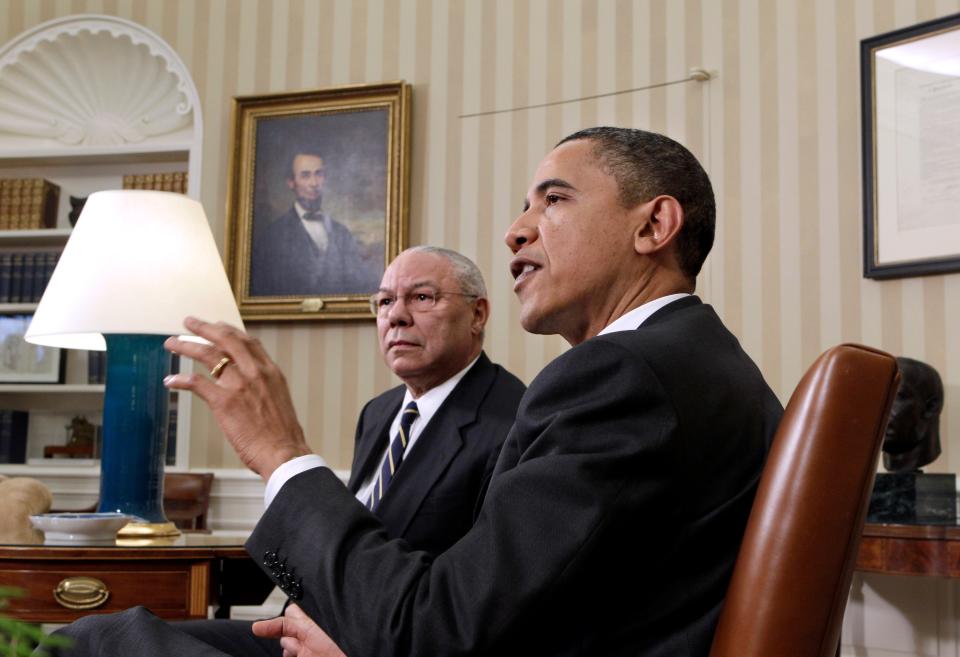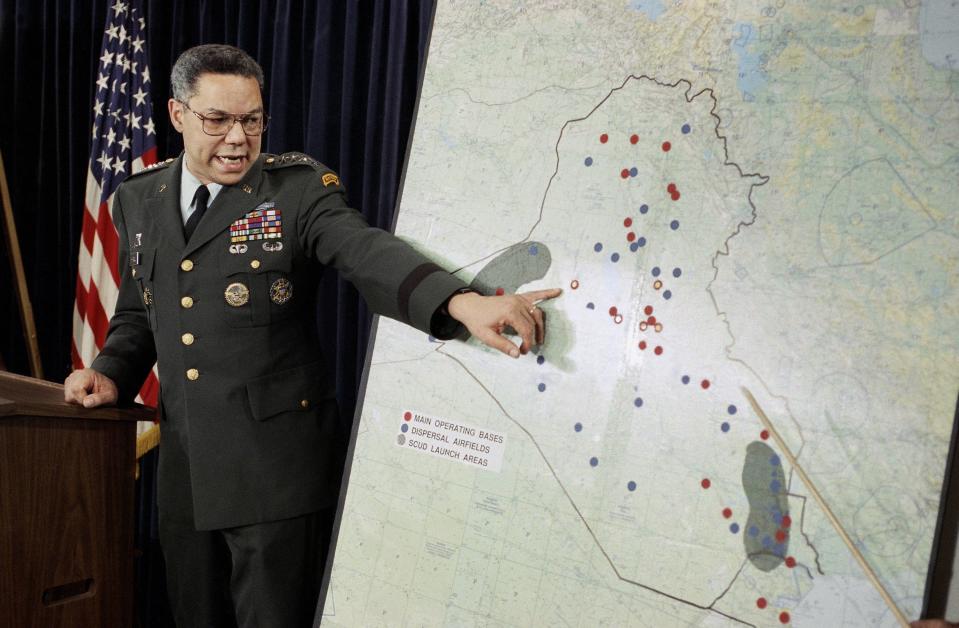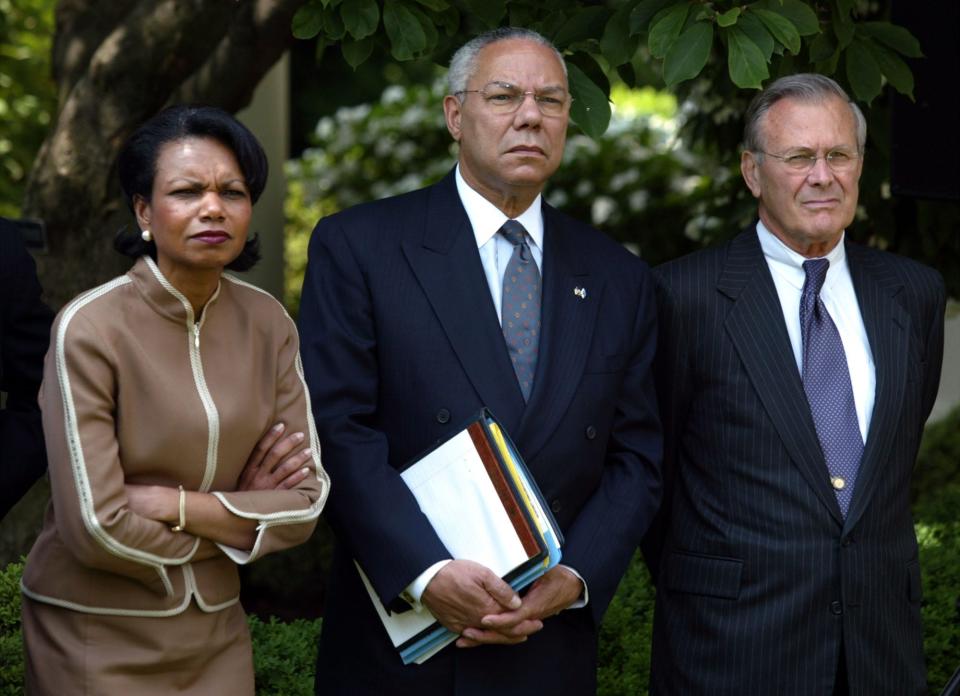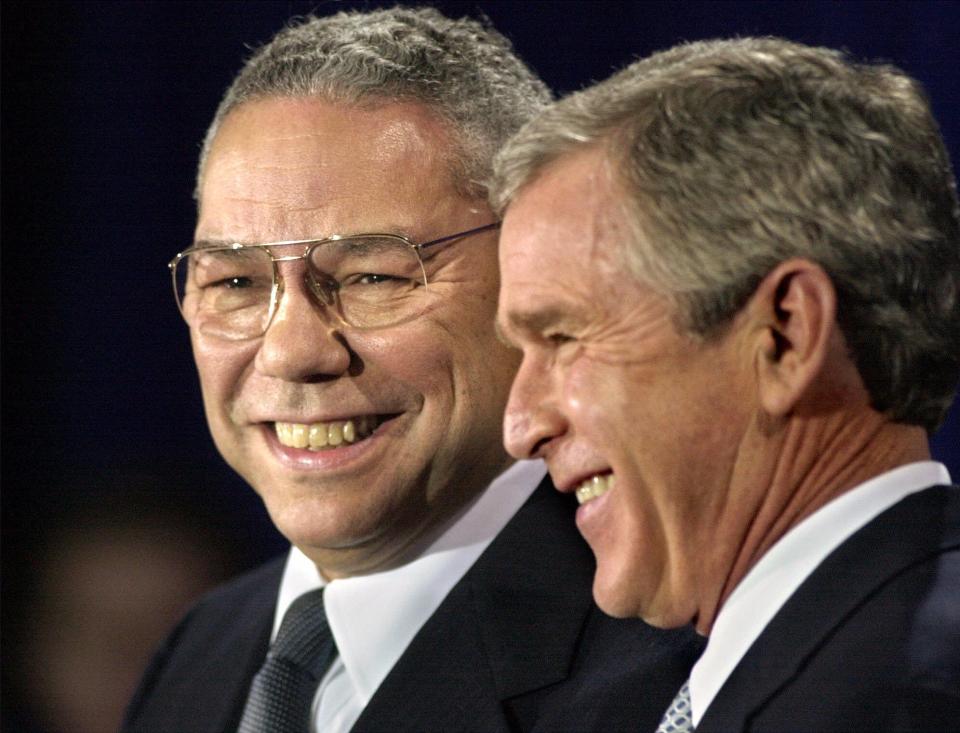Colin Powell's death: The end of an era for moderate Republicans?
- Oops!Something went wrong.Please try again later.
- Oops!Something went wrong.Please try again later.
- Oops!Something went wrong.Please try again later.
- Oops!Something went wrong.Please try again later.
- Oops!Something went wrong.Please try again later.
WASHINGTON – Colin Powell established a legacy in national defense and foreign policy, but politically he was one of a dying breed: a moderate Republican.
The rise of Donald Trump completed a decadeslong estrangement for Powell from the Republican Party, a distancing that began not long after the former chairman of the Joint Chiefs of Staff turned down a bid to seek the GOP presidential nomination in 1996.
Although he served as secretary of state for President George W. Bush, Powell – like other GOP moderates – began to drift away from the base's more aggressive tenor.
Over the years Powell became increasingly critical of the party's plans to cut government programs, mount an aggressive foreign policy, promote divisive social issues like opposition to abortion, and, most of all, follow Trump.
"Colin Powell embodied expertise, practicality, and moderation," said political scientist Jack Pitney, a former Republican. "His memory represents a Republican Party that has ceased to exist at the national level."
More: Colin Powell, first Black secretary of state, dies from COVID-19 complications
From the Bronx to the Joint Chiefs: Who was Colin Powell?
But the retired general achieved something rare in today's politics, according to other scholars.
Historian Gary L. Gregg said Powell should also be remembered as one of the last figures who for much of his career was beloved by significant portions of Americans across the political spectrum.
"There was a time in America when, and maybe (President) Eisenhower is a great example, you could seek the highest political office and you could be revered by essentially big swaths of both sides of the partisan divide," said Gregg, who hosted Powell for his first major policy speech after the terror attacks on 9/11 during a visit to the University of Louisville in November 2011.
"Colin Powell was in that mold, but that doesn't seem to be the case currently in America."
Powell died Monday of complications from COVID-19.
Powell's move away from the GOP
While he endorsed the Democratic candidacies of Barack Obama, Hillary Clinton, and Joe Biden in four straight presidential elections, Powell still considered himself a Republican as he was for much of his life.
That is, until Jan. 6, when Trump supporters invaded the U.S. Capitol, seeking to stop the counting of the electoral votes that elected Biden.
Powell said he could no longer consider himself a "fellow Republican," telling CNN: "You know I’m not a fellow of anything right now. I’m just a citizen who has voted Republican, voted Democrat, throughout my entire career, and right now I’m just watching my country and not concerned with parties.”

As the party veered more and more to the right over the past four decades, Powell became less associated with the GOP brand and was more in the moderate stream of presidents Gerald Ford and George H.W. Bush versus the harder edges of George W. Bush and Donald Trump.
Gregg, director of the McConnell Center for Political Leadership, told USA TODAY that Powell will likely be placed in the GOP pantheon with Eisenhower, another military man, who eschewed the base of party politics.
"There doesn't seem to be a whole lot of room anymore for the kind of Colin Powell leadership or statesmanship in the Republican Party," he said. "But I would say the same thing about the Democratic Party with a microcosm being people like Sen. Joe Manchin. There's not a whole lot of love in the middle."
A decadeslong career
Powell's political career, such as it was, began in the vanguard of the conservative movement as led by President Ronald Reagan.
Reagan appointed the career soldier as national security adviser in 1987.
From there George H.W. Bush, Reagan's successor, tapped Powell to be chairman of the Joint Chiefs of Staff in 1989, which made him the first African American to hold the position.
Powell became an international star as a U.S.-led coalition ejected the Iraqi military from Kuwait in 1991.

After Powell's retirement in 1993, during the first year of the Bill Clinton administration, many Republicans urged him to run for president in 1996, which would have been a historic bid to become the first Black president.
Powell ultimately declined to run for president in part because of his concern about the direction of the Republican Party under the guidance of then-House Speaker Newt Gingrich.
Those concerns did not dissolve in the decades that followed.
As he toured the country promoting his memoir ahead of the 1996 election, Powell criticized Republicans over moves to cut social programs and promote social issues like opposition to abortion. He attacked GOP proposals to dent public education for the children of migrants who entered the U.S. illegally, and described himself as pro-choice on abortion.
In bowing out of the 1996 presidential race, Powell said, "Such a life requires a calling that I do not yet hear."
Powell did support Republican candidate George W. Bush in 2000 and accepted an appointment as the nation's first Black secretary of state.
During those years, he clashed with more hawkish officials in the administration, including Vice President Dick Cheney and Defense Secretary Donald Rumsfeld, particularly over the run-up to the Iraq War in 2003.

Powell famously defended the administration's aggressive stance toward Iraq during testimony before the United Nations. He later called it the most regretful incident of his career, and Bush was the last Republican Powell ever supported for president.
In 2008, Powell endorsed Barack Obama for president over fellow Republican – and military veteran – John McCain.
Powell praised Obama, who went on to become the first Black president, as a "transformational figure," but also spoke fondly of McCain. But he criticized Republican attacks on Obama that included questioning whether he was born in the United States and seeking to tie him to student radicals.
Four years later, Powell said he would "stick with" Obama, while criticizing Republican nominee Mitt Romney's efforts to placate the right wing. He told CBS News that "there’s some very, very strong neoconservative views that are presented by the governor that I have some trouble with."
Colin Powell on Trump
Powell moved further away from the Republican Party and eventually out of it when Trump ran in 2016.
Before his endorsement of Hillary Clinton, hacked emails revealed that Powell had described Trump as a "national disgrace and an international pariah.” Powell also described the U.S. businessman as "nuts."
Trump, and Republican supporters, described Powell as a "Republican in name only," who never really was a part of the party.
Powell vs. Trump: Colin Powell says Trump rhetoric 'dangerous for our democracy,' will vote for Biden
A storied, complicated legacy: Colin Powell's diplomatic and military career – including his WMDs regret
After Powell said he would vote for Joe Biden in 2020, Trump attacked the former secretary of state over his Iraq testimony, and attacked the former defense chief as as "a real stiff who was very responsible for getting us into the disastrous Middle East wars."
Top Republican conservatives who lead the party avoided political talk in praising the late general.
Cheney, the former vice president who often clashed with Powell during the Bush administration, lauded Powell's leadership in the Gulf War in 1991, during the presidency of George H.W. Bush. “I'm deeply saddened to learn that America has lost a leader and statesman," Cheney said.
Senate Minority Leader Mitch McConnell, R-Ky., a congressional leader as Powell drifted away from the Republican Party, praised Powell for his leadership after the 9/11 attacks, saying the former secretary of state charted a new course for the U.S. at the “beginning of our global war on terrorists who will not leave America alone even if we leave them alone.”
Like other Republicans, McConnell cited Powell's personal story, the son of Jamaican immigrants from the Bronx who grew up to be become the nation's top military commander and diplomat. “It is hard to imagine a more quintessentially American story," McConnell said.

Economist Michael Austin, a former adviser to Kansas Gov. Sam Brownback, said he will always feel a personal connection to Powell's biography because of their shared West Indies heritage and political values.
Powell, he said, was one of the few figures growing up who delivered the traditional Republican message that African American voters were receptive towards.
"Seeing him in office always was a sign to me that we could achieve anything regardless of skin color, if we held on to certain traditional and conservative views and policy," Austin, who is running for Kansas treasurer, told USA TODAY.
Andra Gillespie, a political science professor at Emory University whose research focuses on post-civil rights leadership in African American politics, said Powell's brand of Republicanism is anchored to the GOP's "party of Lincoln" history that appealed to a generation of Black voters after World War II.
Black Republicans such as Powell, she said, didn't subscribe to the Democratic Party's economic programs of the New Deal. They also didn't feel comfortable with its segregationist ties in the post-WWII era either.
"That version of Black Republicanism is one that is largely fading, so in some ways, Gen. Powell's death is sort of a clear end of the era," Gillespie said.
"There are Black Republicans who were still not completely aligned with Donald Trump," she added. "And I think that they are going through their own kind of reckoning. Powell, you know, was more of a Sen. Edward Brooke type of Republican than he would be an Allen West type of Republican."
Lara Brown, director and professor at The Graduate School of Political Management at the George Washington University, said Powell was "a conservative in the traditional sense," but the Republican Party went in unique directions behind leaders like McCain running mate Sarah Palin and Trump.
"It was the case that the Republican Party left him to follow a raft of populist grievances and controversial leaders," Brown said. "Colin Powell's legacy is that of principled political adviser and accomplished military leader."
This article originally appeared on USA TODAY: Colin Powell was one of the last moderate Republicans

